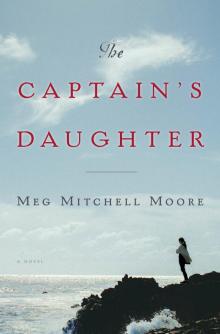- Home
- Meg Mitchell Moore
The Captain's Daughter
The Captain's Daughter Read online
ALSO BY MEG MITCHELL MOORE
The Admissions
The Arrivals
So Far Away
This is a work of fiction. Names, characters, places, and incidents either are the product of the author’s imagination or are used fictitiously. Any resemblance to actual persons, living or dead, events, or locales is entirely coincidental.
Copyright © 2017 by Meg Mitchell Moore
All rights reserved. Published in the United States by Doubleday, a division of Penguin Random House LLC, New York, and distributed in Canada by Random House of Canada, a division of Penguin Random House Canada Limited, Toronto.
www.doubleday.com
DOUBLEDAY and the portrayal of an anchor with a dolphin are registered trademarks of Penguin Random House LLC.
Cover photograph © Dan and Alexandra/Offset
Cover design by John Fontana
LIBRARY OF CONGRESS CATALOGING-IN-PUBLICATION DATA
Names: Moore, Meg Mitchell, author.
Title: The captain’s daughter : a novel / Meg Mitchell Moore.
Description: First Edition. | New York : Doubleday, [2017]
Identifiers: LCCN 2016051410 | ISBN 9780385541251 (hardback) | ISBN 9780385541268 (ebook)
Subjects: | BISAC: FICTION / Contemporary Women. | FICTION / Family Life. | FICTION / Coming of Age.
Classification: LCC PS3613.O5653 C37 2017 | DDC 813/.6—dc23 LC record available at https://lccn.loc.gov/2016051410
Ebook ISBN 9780385541268
v4.1
ep
Contents
Cover
Also by Meg Mitchell Moore
Title Page
Copyright
Dedication
Part One
Chapter 1: Eliza
Chapter 2: Eliza
Chapter 3: Mary
Chapter 4: Rob
Chapter 5: Eliza
Chapter 6: Mary
Chapter 7: Rob
Chapter 8: Eliza
Chapter 9: Rob
Chapter 10: Eliza
Chapter 11: Mary
Chapter 12: Eliza
Part Two
Chapter 13: Mary
Chapter 14: Eliza
Chapter 15: Mary
Chapter 16: Eliza
Chapter 17: Deirdre
Chapter 18: Eliza
Chapter 19: Eliza
Chapter 20: Eliza
Chapter 21: Rob
Chapter 22: Eliza
Chapter 23: Rob
Chapter 24: Mary
Chapter 25: Rob
Chapter 26: Eliza
Chapter 27: Rob
Chapter 28: Deirdre
Chapter 29: Eliza
Chapter 30: Deirdre
Chapter 31: Mary
Chapter 32: Charlie
Chapter 33: Eliza
Chapter 34: Eliza
Chapter 35: Mary
Chapter 36: Eliza
Chapter 37: Rob
Chapter 38: Mary
Part Three
Chapter 39: Rob
Chapter 40: Eliza
Chapter 41: Deirdre
Chapter 42: Eliza
Chapter 43: Rob
Chapter 44: Mary
Chapter 45: Rob
Chapter 46: Eliza
Chapter 47: Mary
Chapter 48: Eliza
Chapter 49: Mary
Chapter 50: Eliza
Chapter 51: Eliza
Chapter 52: Rob
Chapter 53: Eliza
Epilogue
Acknowledgments
About the Author
For Frank Moore, 1947–2016
And for Shannon Mitchell, another captain’s daughter
PART ONE
June
1
BARTON, MASSACHUSETTS
Eliza
“No,” Sheila Rackley was saying, “that’s not how it happened at all, you have to listen to this, it was way worse…”
Just then one of Sheila’s children, whose hair was red, whose skin was a pinky brown with freckles, and whose eyelashes were pale, just like his mother’s, appeared before the group of women. He cleared his throat like a senator about to introduce a bill, and said, with great ceremony, “Jackie is being mean to me, Mommy.”
An expression of annoyance briefly crossed Sheila’s face; its passage was so fast that Eliza Barnes wasn’t sure if she’d imagined it or not. It was June, the last day of school, and already hot. They were at the club. Someone had ordered a round of Bloody Marys, which were sweating as much as the women themselves, though the women did it more delicately. Even the celery in Eliza’s drink seemed to have given up, allowing itself to slip in an undignified manner into the tomato juice. Sheila held up a hand to the women and said, “To be continued,” before turning to her son and stage-whispering, “Edward, you did absolutely the right thing, telling me politely instead of screaming, it’s just that Mommy was in the middle of a story—”
“Is that someone’s phone?” asked Jodi Sanders.
“I don’t care,” said Catherine Cooper. “If it’s mine, I’m letting it ring and ring. It’s summer vacation! I’m off duty.”
“Actually,” said Eliza. “You’re sort of on duty, now that it’s summer vacation, wouldn’t you say?”
“I’ve got two words for you, Eliza,” said Jodi. “Summer. Nanny.”
“Hear, hear,” said Sheila. Her Bloody Mary was gone; she flagged the pale wren of a girl who was serving that day and asked her for another. “Kristi Osgood is home from McGill.”
“I already hired her,” said Deirdre Palmer.
“Figures,” said Sheila. “You need her for your one perfect, well-behaved Sofia.”
“She does!” said Eliza. “You have no idea how much work this EANY gala is for Deirdre.” East Africa Needs You, Deirdre’s pet project. Deirdre and Eliza went way back—all the way to a breast-feeding class they took at the hospital soon after Sofia and Zoe were born. Sofia and Eliza’s oldest daughter, Zoe, had no choice but to be best friends, really; their friendship had such auspicious, intimate beginnings.
“Eenie, meenie, miney, moe,” said Sheila, one hand on her son’s shoulder. “Anyway. To continue what I was saying. What was I saying?”
“Mom,” said Eddie. “I mean really mean, let me just tell you what—”
Sheila emitted a small frustrated huff, made a sun visor out of her hand, and peered at her son. After a quarter of a minute she stood and led him firmly to a secluded spot farther from the pool where she crouched in front of him and gesticulated wildly. Eliza could see Eddie nodding, then shaking his head, then nodding again, before turning away and trudging back toward the knot of kids by the pool, a doleful sag to his skinny shoulders.
Eliza scanned the pool area for Zoe and her other daughter, Evie; Sofia and Zoe were reluctantly and temporarily allowing Evie’s ten-year-old earth to orbit their thirteen-year-old sun.
Whenever Eliza pointed out that she herself would have given her eyesight or at least three of her toes for a sister when she was growing up, Zoe let her eyes drift into an almost-roll that she always caught at the last second. Because she knew that Eliza’s loss of her own mother when she was so very young (only twelve! Younger than Zoe was now!) had induced in Eliza a pain that had faded over time but had never gone away, that still—often—came out of nowhere to strike at her wrathfully and unforgivingly, like a rheumatoid arthritis flare-up.
Eliza had not had the vocabulary at the time to define the effects of her mother’s death. But she understood, then and now, on a deep and primordial level that every day after the event would become a search for the thing she’d lost.
As a result: lots of therefores.
· Therefore, Eli
za would be the best mother possible, because she was alive to be so.
· Therefore, she would appreciate each and every day, no matter what it brought.
· Therefore, she would take exquisite care of herself: omega-3s, mammograms, the occasional green juice.
· Therefore, she would kiss her daughters good night and tell them she loved them even on days that they infuriated her or left their dirty clothes on the bathroom floor and hair balls in the shower drain. All of which they did.
Eliza lifted her face to the sun and let the voices of the women around her fade into the background. Jodi was asking, “Whose phone is that?” Sheila was ranting, “Honestly, if they spend all summer bickering I’m going to hire two separate nannies and spend the whole summer by myself in Hyannis,” and Catherine was saying something about how Henry was incensed about the increase in docking fees at the club this year and how some people were starting to look elsewhere; didn’t the superior beings who ran the club know that they couldn’t just do that without any warning?—some people did not have unlimited funds with which to dock their boats. Not that it was a problem for the Coopers, of course, but what if it was a problem for others?
Eliza breathed in, breathed out. Sun on her face on a June day. Drinks in the early afternoon, carrying with them a sensation of illicitness that made them taste even better, like the women were all teenagers, getting away with something while their parents had their heads turned the other way. Cosseted offspring splashing gleefully about in the safe confines of the yacht club pool, slathered in expensive sunscreen, clad in swimsuits that ranged from adorable (Evie, rocking a mini Boden one-piece with age-appropriate polka dots) to borderline tasteless (Jackie Rackley, also thirteen, in a bikini that looked ready for Copacabana). Who would have thought that this, any of this, was what the future held for a lobsterman’s daughter?
Eliza didn’t want to open her eyes, because if she did, if she caught the glance of Jodi or Catherine or Sheila, one of them might whisper aloud what Eliza was sure they all thought of her secretly. Interloper, they’d say. You don’t belong here.
That was something she’d been feeling lately a lot more than usual, and for that she blamed Phineas Tarbox. A ridiculous name, Phineas Tarbox. An actual Boston Brahmin, the real deal. His office was on Commonwealth Avenue in Boston’s Back Bay, not far from Judith’s home. Judith was Eliza’s mother-in-law. In fact, Phineas had been recommended by Judith, of course, like many things in their lives were. Judith was the unseen conductor of their orchestra, always calmly moving her baton.
It was after their visit to Phineas Tarbox that Eliza felt something dark, almost sinister, creep into her marriage. An unwelcome guest. It wasn’t just that Rob was busy and distracted with a big work project, often too tired at the end of the day to do anything but fall into bed, although that was true, or that the girls gobbled up time and energy from both of them, which was also true, and expected. It was something more. It was that sometimes she looked at him, this man she’d been married to for so many years, this man whose body was so familiar to her that she’d recognize even the crease of his elbow if shown a photograph of only that, and she saw a stranger.
“Eliza!” said Sheila. “Wake up, that’s your phone that’s been ringing this whole time.”
“What? Oh. Oh geez, sorry.” Eliza scanned the pool again, located Evie, who was following Zoe around like a pup tracking its mother, and dug in her mammoth pool bag for her phone. A Maine area code. Only her father called her from Maine, and this wasn’t his number on the caller ID.
“Hello?”
“Eliza?”
“This is Eliza.” The voice on the other end was familiar in a way that seemed thrice removed from her ordinary life.
“Liza, it’s Russell.”
Something somersaulted—one of her organs. Could organs somersault? Many years ago, Eliza had completed two years of medical school at Boston University, so she knew that they couldn’t. Not that you really needed the medical training to know that.
“Russell Perkins?” She had to get up from her lounge chair and walk away to shield herself from the other women, who had fallen silent, sensing from Eliza’s tone, both voice and skin, that something dramatic was about to happen. Or, maybe, had already happened.
“That’s the one,” said Russell Perkins, Eliza Barnes’s first love, her knight in shining armor, the Bruce Springsteen to her Mary. Zillions of memories flooded her: a pickup truck, a barn in winter, half of her clothes off, new desire. A nearly deserted island in summer, the inside of a car, a room in Bangor. She was sixteen again, seventeen, eighteen, all in a matter of seconds.
She glanced back at the women, who had returned to their conversation but were stealing occasional tastefully curious glances at Eliza, glances that said both We are here for you if you need us and Are we missing something good?
“Listen, Liza, you might want to get yourself up to Little Harbor just as quick as you can.”
Ohmygod, thought Eliza. Her legs almost gave out and she had to lean against the fence that enclosed the pool. It was happening. Her dad was gone. He’d been pulled overboard by a trap. He’d had a heart attack, or a stroke, or a fight that went wrong. He’d rolled his truck over on the way home from the bar. It was bound to happen, each of those evil creatures was waiting in the wings to lay their pronged teeth into Charlie Sargent’s skin. Hazards of the job, of the lifestyle, the pay grade.
All those years they spent together, just the two of them, leaning on each other. All those chicken cutlet dinners she’d prepared, and now he was gone. She was officially an orphan.
Could you be a thirty-seven-year-old orphan?
“Liza?”
She croaked out something that tried to be a word but didn’t make it.
“Your dad hit his head on the boat this morning, the Coast Guard had to go out and bring him back in. Val took him to the emergency room, his arm was hurt too.”
“He called the Coast Guard?” Her dad would never call the Coast Guard, not unless it was a very serious emergency. She italicized the words in her mind because that’s the way her dad always said them to her. You take care of things yourself unless it’s a very serious emergency, Eliza.
“He won’t let anyone help him. He’d never tell you himself that he needs you, so I’m telling you. He needs you.”
Eliza recalculated. She wasn’t a thirty-seven-year-old orphan. She wasn’t an orphan at all. But her dad needed her. She turned back toward the lounge chairs. She could see that Sheila Rackley was finally completing her story and that it had been a doozy. Deirdre had her hand over her mouth, and her narrow, bronzed shoulders were shaking with laughter. Even Catherine Cooper, who was a tough audience, was smiling.
“Liza?” said Russell, and her stomach twisted again in that unsettling way. Nobody else called her Liza.
“Okay,” she said. She cleared her throat. She turned toward the pool and saw Zoe standing at the edge of the diving board. She felt the same urge she always felt, to call out Don’t jump! because bad things could happen on diving boards and she wanted to protect her children from every possible danger. She fought the same impulse each time she watched them buckle themselves into the backseat of a friend’s car and wave at her nonchalantly. Don’t go! she always wanted to say. Stay here with me, where you’ll be safe! The world was full of untold menaces.
Zoe executed a perfect swan dive, which had been honed by hours of practice and the assistance of a personal dive coach. Eliza knew that was ridiculous. Yet because of the coaching the dive was gorgeous. Eliza kept her eyes on the water until Zoe’s head popped up (because you never knew) and felt the odd combination of pride and wonderment she often felt watching her daughters. It was almost envy, although she’d never say that out loud, because that was embarrassing. The things they knew how to do, the professional instruction they’d received in their young lives! Skiing, tennis, sailing—pastimes that had been so far off Eliza’s radar when she was a child that she had thought only kid
s in movies engaged in them.
“Okay,” she said again. “Okay, I’ll get up there as soon as I can. I just have to figure out a couple of things, make some arrangements for Zoe and Evie. For my daughters.”
When Eliza was Zoe’s age all she knew how to do was row a skiff from the wharf to her dad’s boat, the Joanie B, named after Eliza’s mother, and how to use the gauge to measure the lobsters, and how to V-notch the pregnant females. She could also crack a lobster like nobody’s business, pull every scrap of meat out, wasting not even a fraction of an ounce. Not exactly a useful skill set in Barton, although once, admittedly, at a midsummer yacht club clambake she’d had one too many gin and tonics and had made the rounds with her double-jaw lobster crackers, allowing herself to be timed by Deirdre’s husband, Brock. (In her defense, the gin and tonics at the club were very strong.)
“Okay? Thank you for calling, Russell. Thank you, really.” Her organs did that strange gymnastics again.
Last she knew of Russell he’d moved up to Bangor and was training to go into sales. Life insurance, or something equally necessary and staid. Life insurance! Russell Perkins, one of the best lobstermen Little Harbor had ever seen. It was outrageous. Must be that that hadn’t stuck, that he’d come back. The good ones always came back. They couldn’t really figure out any other way to live—they didn’t want to.

 The Islanders
The Islanders The Admissions
The Admissions The Arrivals: A Novel
The Arrivals: A Novel Two Truths and a Lie
Two Truths and a Lie The Captain's Daughter
The Captain's Daughter